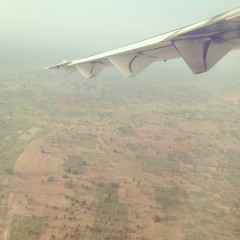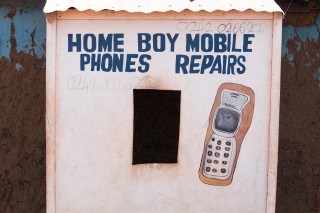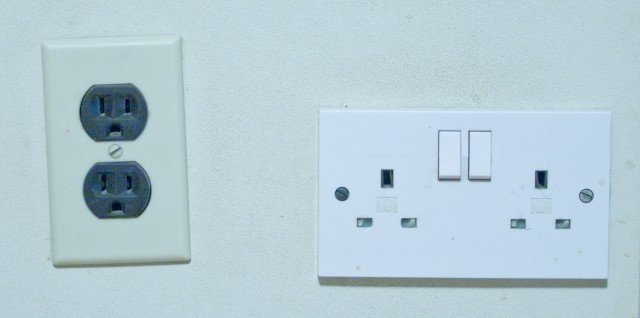Baptist Medical Centre
Nalerigu, Ghana
Travel
Virtually everyone whose final destination is Nalerigu flies into the Kotoka International Airport in Accra. There are several major airlines that fly into Accra, including KLM, British Air, Lufthansa, Air Emirates, Air France and Delta, direct from New York to Accra. Several of these arrive every night of the week.
From Accra travel to Nalerigu usually involves flying to Tamale (1hr) and then a hospital driver will take you to Nalerigu by truck (2.5hrs). Flights from Accra to Tamale are available daily but we prefer volunteers not arrive on Sundays and Tamale arrival must be by 4pm to avoid driving at night.
The only vaccination required for entry into Ghana are Yellow Fever vaccines. You MUST present proof of this vaccination before you can obtain a visa for Ghana and when going through immigration at the airport in Accra. If you do not have the certification or vaccine, you will be required to pay $20 and get a Yellow Fever vaccine at the airport.
- Oral Typhoid – lasts 5 years, injection only good for 1 year-total of 4 pills taken every other day for 4 doses
- Menactra (meningitis)
- Updated TdaP
- IPV booster (polio)
- Hepatitis A series – 2 injections 6 months apart
- Hepatitis B series – #1, #2 one month later, #3 six months after first
- MMR – 2 total (you should have received as a child)
- Varicella – No immunization for this is available in Ghana, many people are seen with this
- Rabies series – only if going for more than a month
Check with your local health department about obtaining these vaccinations. You should also ask about obtaining boosters for certain immunizations that you probably received in childhood, in particular polio and tetanus.
Be sure to check with your travel agent for particulars on luggage allowance including number of pieces, size, and weight they allow. Overweight charge on excess baggage is very expensive. Most airlines allow two checked bags per passenger at 23kg (50lbs) per bag. Check with the airline for current policy. Also note that most airlines have become rather stringent about criteria for carry-on items.
If you are flying from Accra to Tamale, the domestic flights only allow 23 kilos per passenger. They usually charge about 15GHS (~1.3USD) per kilo overweight.
Due to the change of planes in Europe and the possibility of late departures and/or arrivals, we strongly recommend that you pack enough in your carry-on bag for several days’ living, in case your suitcase doesn’t arrive until several days after you do (it may even arrive after you have departed Accra for Nalerigu).
When packing any liquids we recommend that you double bag them in Zip-Loc-type bags so that they won’t leak if crushed.
Remember to keep all important papers with you at all times, in your carry-on and NOT in your checked luggage.
Francis Ackom, the BMC guest house coordinator, will help your coordinate your pickup from the airports and travel to/from Nalerigu. Please contact them with your itinerary and copy us on all correspondence. The Baptist Mid-Mission Guesthouse in Osu, Accra can be contacted to reserve a room for you the night you fly in (Manager James at [email protected] or +233 20 456 7209)
We are trying to limit volunteer pick-up trips from BMC to be on weekdays when our drivers are working, therefore please schedule your flight to arrive in Accra so that you can take the flight to Tamale on a weekday.
The Mid-Mission Guesthouse in Accra can be your stopover point for the night upon arrival or upon leaving depending upon your flight schedule and the domestic arrangements you want. We can coordinate with the guesthouse at BMC to make your transition from here to there as smooth as possible. Domestic flights to/from Accra-Tamale typically cost around 190USD roundtrip.
Payment for either guesthouse can be made in U.S. dollar cash or Cedi cash (local currency). We do NOT accept personal checks, credit cards, or travelers checks. One can also pay via MTN Mobile Money. See the “Money” section below for more information.
- your exact arrival and departure dates
- the airline you will be using
- the number in your group and the gender make-up
- how many nights you will be at the guesthouse
- any special dietary restrictions you may have
Good planning and early reservations are very important. Please copy us at BMC on all of this correspondence information.
For inside the airport we have three cautionary notes:
- You should note that no photographs should be taken at the airport or at any police or military installations.
- Occasionally, upon entering the airport, young men who are not officials are there looking for a tip or “dash” from unwary travelers in exchange for “helping” them. Be firm and confident, tell them that you know what to do, and steer clear of them. Do not give your passport or other papers to anyone but the officials behind the desks or with official identification (badges/uniforms).
- If anyone meets you inside the airport claiming to be with the Mission, they should be familiar with your party’s names. If they don’t have this information, be polite but tell them that your party is meeting you outside and then proceed outside on your own. Do not give them your name nor any money or papers; do not give them information about yourself or your destination.
Yellow Fever Screening
A health officer will be checking arrivals’ Yellow Cards to verify they have been vaccinated for Yellow Fever. We’ve had occasional reports from volunteers of these officers demanding $20. This is illegal. Kindly ask to speak to their superior and work your way up the ladder until you reach a supervisor who does not condone such extortion of money.
Immigration
After the health check you will go to an immigration officer. There are several booths here, some marked ECOWAS (West African Nationals), Ghanaian Residents, and Other Nationals. Join the line of “Other Nationals” (as the lines at certain booths get short, you might be directed to join a different line). The Immigration Officer will check your passport and ask some basic questions about your travel purpose and destination. Unless you are obtaining a visa upon arrival (only in rare, special cases), you do not need to pay anyone to pass through Immigration.
Baggage Claim Area
There are push carts available for your luggage at no charge. There may be porters wanting to help you with your luggage and if you allow them they will expect to be paid. If you can manage your luggage on your own, you can politely and firmly let them know you can handle it and just say, “No, it’s okay.” If by chance your luggage does not arrive on the flight with you, you will need to go to the missing luggage desk to fill out a missing luggage form. This will take some time to complete with the information you have about your missing luggage.
Pro tip: take a picture of each of your bags before you check it with the airline. This can really help our people recover it quickly when it finally arrives late.
Customs
Most of our visitors have nothing to declare at Customs and you can just keep going past this point. If they stop you just be polite and cooperative. The porter may suggest that you “give something to the customs official” but this is certainly not necessary, may be illegal, and we don’t recommend it!
Rarely do we have any problems with customs officials at the airport. They are ready and eager to have people visit Ghana and may even pass your bags through without opening them or charging any duty.
If you are bringing any medical supplies for the hospital and are questioned about this, tell the customs agent that the supplies are for Baptist Medical Centre in Nalerigu, in the North East Region. The hospital’s reputation extends to many places in Accra and this should clear the way for you (even medications should be allowed through without trouble, the only exception being narcotics, which you shouldn’t try to bring anyway).
If you have large quantities of medicines & supplies, it may be helpful to bring with you a letter stated that they are donated items and NOT for sale in Ghana but will be given away at BMC which is a mission hospital.
In the case of transporting special equipment, let us know in advance and we can write an official letter for you to present to customs explaining the origin and use of the equipment.
Outside the Airport
When you exit the airport building you will be in a fenced off and covered greeting area. There is usually a large crowd of people along the barriers waiting to greet new arrivals. Keep your personal items well secured and expect to be pestered by men offering you taxi rides. Your pre-arranged driver will meet you there and help you get the bags to the car. They will tip the porters/carriers for you and you can reimburse them later.
If for some reason there is no one there to meet you (extremely rare), proceed as follows:
- Call one of the contact numbers you received in your emails from BMC (Francis Ackom, Johnny Owusu, William Haun)
- If no one should answer, find a taxi, and tell the taxi driver to take you to the Mid-Mission Baptist Guesthouse in Osu off Oxford St and right next to the Christiansborg Baptist Church Osu. Negotiate and settle on a price BEFORE getting in the taxi.
By Air
 The fastest, least tiring, and cheapest (unless yours is a large group) method to get from Accra to Nalerigu is by air. African World Airlines and PassionAir are private airlines that operate daily between Accra and Tamale, which is only two-and-a-half hours from Nalerigu.
The fastest, least tiring, and cheapest (unless yours is a large group) method to get from Accra to Nalerigu is by air. African World Airlines and PassionAir are private airlines that operate daily between Accra and Tamale, which is only two-and-a-half hours from Nalerigu.
Once we know your arrival and departure dates between your home and Accra, we will schedule your in-country flight on AWA and purchase the tickets; you will reimburse us upon your arrival in Accra. We will arrange for someone to take you to the airport for this flight. Someone from Nalerigu will pick you up at the Tamale airport and bring you to Nalerigu, as well as take you back at the time of your departure.
To know the current airfare for this flight (usually around 190USD roundtrip), ask Francis Ackom and he will make these arrangements for you.
By Land
A larger group (>4) can usually save money by renting a van and driving from Accra to Nalerigu, but is an all day trip (12-15+ hours). Another option is an overnight trip by public bus. Let us know if that is something that interests you.
Returning to Accra
We normally schedule the return trip early in the day to help insure arrival into Accra in time to make the international departure. The biggest reason for this is to allow for the possibility of the flight from Tamale to Accra being cancelled (weather, especially in harmattan; mechanical problems; etc.). If you miss that flight for whatever reason you would have a later domestic flight you could take to not miss your Accra outbound flight.
The electrical current in Ghana is 220 volts; in the U.S. the current is 110/120 volts. Plugging a 110v device into a 220v outlet will instantly fry it. Always carefully check any appliances or electronic devices for compatibility before plugging them into a 220v outlet.
The BMC compound is unique in that all the houses are wired for both 110 and 220 volts.
The local unit of currency is the Ghana Cedi (SEE-dee) and Pesewah. A Ghana Cedi is valued at less than the US dollar (1USD = ~12GHS). Be sure to check the current exchange rate before traveling.
We advise that you exchange money at the Accra airport upon arrival. There is a ForEx in the baggage claim area or you can ask the driver to take you to Marina Mall across from the airport.
You can get money exchanged in Accra and other major cities. You will get better exchange rates for the $100 (most places ONLY accept the newer $100 bills with the larger faces on them).
In Accra and Tamale, ATMs are available at the airport and many banks. Check with your bank and the ATM you are using to find out about any fees you may incur using your card overseas and to withdraw money in a different currency. An ATM is available now in Nalerigu but only allows 1000GHS withdrawals and charges 15GHS per use. It isn’t always reliable to be working or stocked with cash.
Credit cards have very limited usefulness here, even in the cities. The nicer hotels and restaurants will accept them but often charge extra fees for credit card use. Only a handful of places accept them in the north. It’s okay to bring one, just don’t count on being able to use it.
If you will be here for several months or more, be sure that there is a family member at home who has agreed to keep up with your bank account and has the authority to withdraw money in case of an emergency.
Internet access is available at both BMC and the Baptist Mid-Mission Guest House in Accra.
 Cell phones are available for purchase in Ghana ($20 or more), but if you bring a phone from the US it can be used. The phone has to be unlocked (check with your network provider) and it may be used here by simply changing out the SIM card (a SIM can be purchased in Nalerigu for under $5). Cell phones here work on a prepaid system and you have to recharge the phone by loading in more time. It only costs to make cell phone calls, not to receive. Typical charges to call the US are only around 15cents a minute.
Cell phones are available for purchase in Ghana ($20 or more), but if you bring a phone from the US it can be used. The phone has to be unlocked (check with your network provider) and it may be used here by simply changing out the SIM card (a SIM can be purchased in Nalerigu for under $5). Cell phones here work on a prepaid system and you have to recharge the phone by loading in more time. It only costs to make cell phone calls, not to receive. Typical charges to call the US are only around 15cents a minute.
Many missionaries and volunteers use FaceTime, WhatsApp and Signal to make calls over the internet. Since BMC’s internet connection is via cellular data it is not always possible to make video calls but audio calls usually work.
